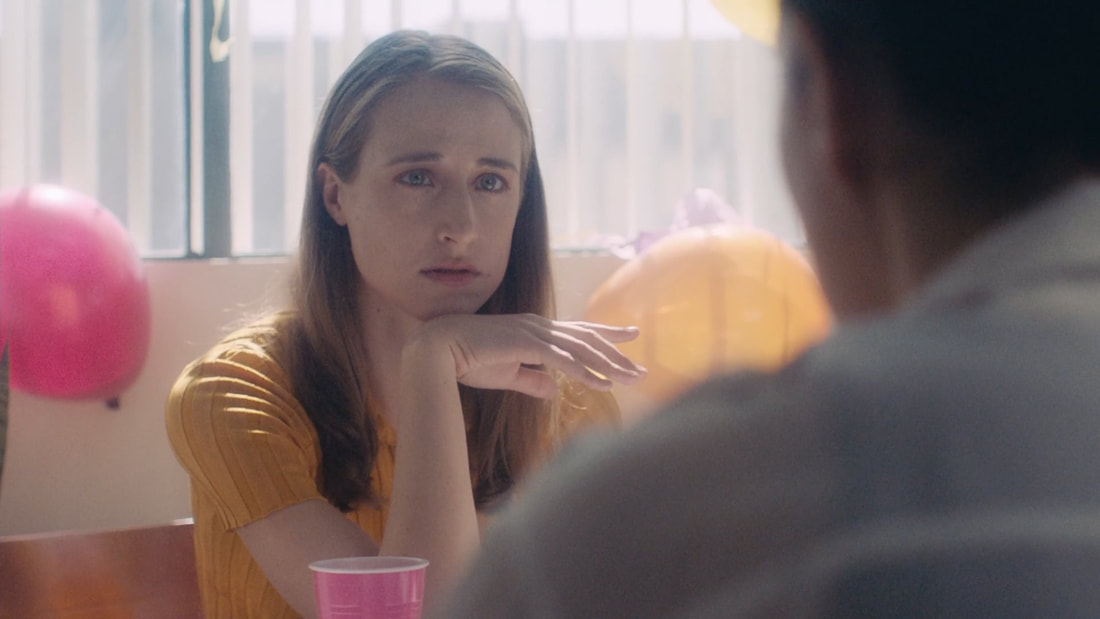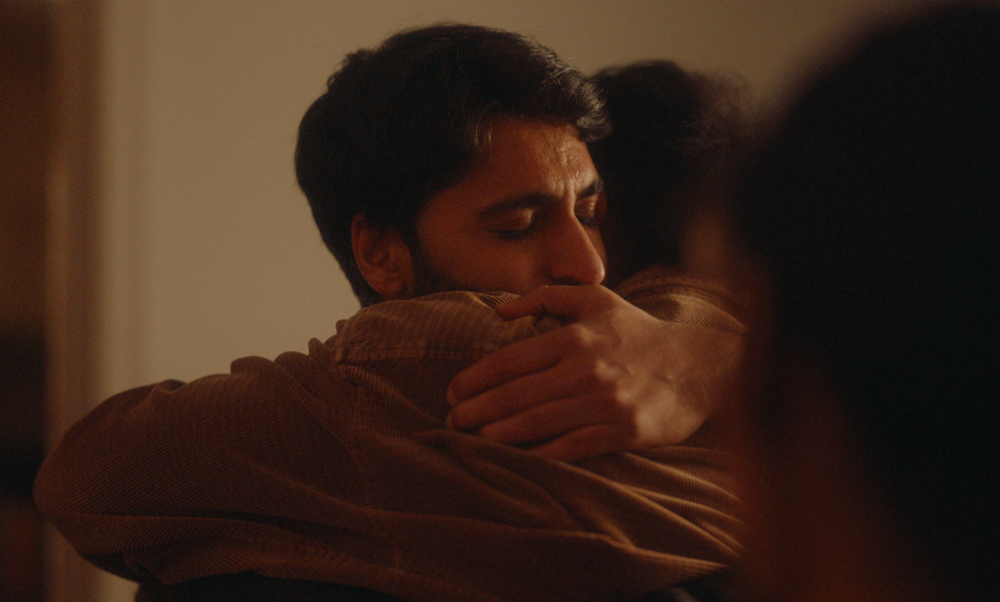|
Ellie Moon stars as “Rosy” in director Karen Knox’s ADULT ADOPTION, a levelFILM release. Credit : levelFILM Director Karen Knox and actor-writer Ellie Moon make a charming collaborative team in the absurdist comedy “Adult Adoption.” Set in contemporary Toronto, the film follows Rosy (Ellie Moon), who has aged out of foster care and is now working as a bank teller. She has a solid job, but is living a life that does not feel personal to her. Rosy seeks to make sense of the world around her, to find a semblance of purpose and to fill the void felt from growing up without parental figures. One day her coworker Helen (Leah Doz) brings up the idea of meeting prospective parents, an idea to which Rosy immediately warms to. Through an online service, Rosy decides to connect with older adults who are in search of adult surrogate children. The journey of familial love introduces her to “dates” with various parental-like figures who have the potential of stepping into a guardian role, but they are figuring things out just like Rosy is. Karen Knox brings an off-center sensibility to her direction, which complements the protagonist’s awkward path of self-discovery. The zany storytelling accentuates the ridiculousness of assuming anyone has the answers to all of life’s mysteries.
From loneliness and neglect to chosen families and self-acceptance, significant themes are approached from a tinted lens. “Adult Adoption” is made with a soft pastel palette, as though depicted from rose-colored glasses. The production design by Talia Missaghi and the cinematography by J Stevens add to the cautious optimism this film evokes. The protagonist shares some of her deepest most vulnerable thoughts to strangers. One potential parental figure in particular, with whom Rosy spends increased time with, is not as attentive as Rosy would like. The sense of frustration Rosy experiences when the disillusion of life kicks in is one of the more resonating moments in the film. After years of not feeling wanted from foster families and adoption agencies, she wants to finally experience being part of a family. Ellie Moon’s strength both as an actor and writer brings a great level of openness to understanding Rosy’s perspective. Moon’s screenplay finds strength in the dynamics shown between Rosy and two prospective parents. Through the characters’ interactions, the film engages with manifestations of love and loneliness in familial relationships. Everyone involved in the adult adoption process is searching for a balm to solitude in some way. Sometimes the simplest gestures can speak to a need of being comforted. Rosy at one point asks one of the prospective parents she regularly meets with to brush her hair. With a quirky pop song bopping in the background, the hair-brushing scene shows Rosy’s level of maturity as though she is frozen in youth. In addition to Rosy’s childlike bedroom and the various uses of pastel colors throughout the film, “Adult Adoption” makes use of visual cues to accentuate that the protagonist is emotionally stuck at a certain age. Self-love plays a role in Rosy uncovering her hurt and finding a way to process it. She often searches for emotional support in other people. She brings with her a certain level of expectation from them, in addition to her needs of being accepted. The journey leads her to realize the importance of her own self-acceptance. With a single line in the film — “I am the creator of my own life” — Rosy embraces the practice of self-love with much greater complexity and control. As such, the world begins to open up for her. In one of the film’s most resonating moments, she walks out of a club with a spring in her step. Through Moon’s facial expression and the way this scene is shot, her surroundings become clearer. This moment is a fitting parallel to the very last shot of the film that sees Rosy surrounded by trees: a significant symbol of growth, change, nourishment. Rosy’s life is in bloom. The film tackles a subject not often explored in many films — adult adoption. This subject is conveyed with care, and an emphasis on the wide range of emotions one would imagine this process involves. There’s also a quirkiness to the telling of this story. From the music choices and acting, to the direction and writing, “Adult Adoption” brings a mostly refreshing approach to big themes. While some scenes feel too lightweight for the subject matter, the film more often than not reaches a strong balance of humor and sadness. Above all, Ellie Moon’s performance as Rosy is an endearing anchor. She captures the sensibility of a young woman trying to figure out her path in life while frozen in time. “Adult Adoption” is currently screening at the Revue Cinema in Toronto.
1 Comment
Adolyn H. Dar and Ali Kazmi in "Desi Standard Time Travel" Sometimes it’s easy to forget that your parents are more than your parents. That they have their own history, aspirations and dreams in addition to raising children. With time and the passing of it, comes a deeper appreciation of the sacrifices and responsibilities involved within parenthood. The weight of such responsibility isn’t always at the forefront of every conversation between a parent and child. Nor is the possibility that any given conversation could be the last. You don’t know how much time you have with someone on earth. Time is the one thing you can’t make more of — but what if you could relive past moments with lost loved ones? What if you could go back in time and say what you wished you could’ve said more often? Kashif Pasta’s “Desi Standard Time Travel” answers these questions with a gentle urgency. This sci-fi drama short finds a sweet narrative within the wishful train of thought that is, ‘If only I could go back in time’. The film tells a character-driven story centered on fatherhood and unconditional love. With an incredibly human story at the core of a fantastical plot, “Desi Standard Time Travel” is an enjoyable and poignant reminder to be present in life.
When new father Imran (Adolyn H. Dar) suddenly loses his own dad, an opportunity arises to travel back in time for an evening. Imran receives a call to accept a time travel voucher in his late dad’s name — in substitution of a will, this voucher is left behind for Imran to redeem wisely. He reflects on a time he was assembling a crib while on the phone with his dad. The conversation ended on a haunting note; that Imran will call one day, and his dad won’t be there to pick up. With regret and longing, Imran jumps at the opportunity to end things on a better note. But instead of the travel device taking Imran back to that particular phone conversation, he is transported to the early 90s — before he was born. His parents had recently immigrated to Canada. His father was not a father yet; he was on the cusp of it, awaiting Imran’s birth. When Imran steps into this 90s childhood home and is faced with a younger version of his father, the sense of rediscovery is overwhelming. His father didn’t have all the answers. He too felt uncertainty around becoming a parent for the first time. The film packs plenty of resonating themes in a short timeframe, which is fitting for the overall message this story conveys about time itself. The relationship drawn between the concept of time travel and the fragility of life is beautifully depicted. The concept never overpowers the story; it has the opposite effect, where the characters and the family dynamics ground the sci-fi elements. Pasta’s direction, in addition to the screenplay he co-wrote with Nessa Aref, highlights intimate moments of being alone with your thoughts. You spend enough time with Imran’s character to understand he is quietly processing different stages of grief — from regret and anxiety, to much deeper realizations and his urge to understand as much about his dad as possible when presented the opportunity. Time travel as a plot device is used so intimately here, and is a touching reminder that the very concept of time after losing a loved one can be indistinguishable. Days blend together and before you know it, a year has passed. The abyss of grief can feel as though life has come to a standstill. “Desi Standard Time Travel” hits pause on the fast-forwarding of life in its unwavering focus on a father and son opening up to each other. Their emotional vulnerability, played beautifully by Adolyn H. Dar and Ali Kazmi, invites you to reflect on how present you are with your own loved ones. Which particular moment in your parents’ life would you revisit, or want to learn more about? “Desi Standard Time Travel” poses just as many if not more questions than answers. Through an intimate use of the time travel concept, the film shines at its own pace and sparks moments of personal reflection. It’s a deeply personal story of second chances, new beginnings, and making memories full of joy. The decision to take the story back to before Imran was born stresses his parents’ individuality and particularly his father’s nerves about becoming a parent. The nostalgic warmth that radiates from Imran’s childhood home conveys a home full of love and possibility for what the next day will bring. "Desi Standard Time Travel" leaves you in a state of deep appreciation and wonder for the most cherished relationships in life. “Desi Standard Time Travel” has screened across film festivals in Canada, and won a variety of awards including Best Short at Toronto Reel Asian. The film is currently in contention for a Canadian Screen Award this year; nominations will be announced on February 22. |
Archives
June 2024
Categories |



 RSS Feed
RSS Feed